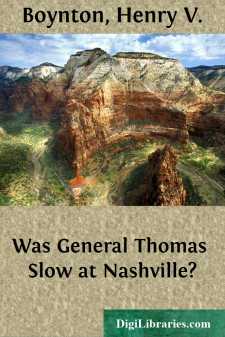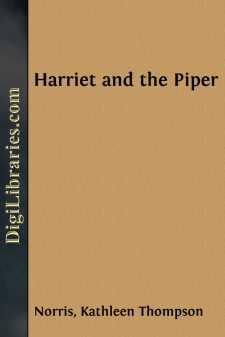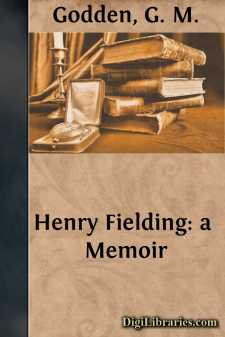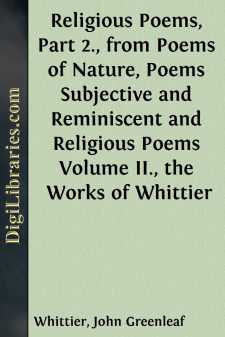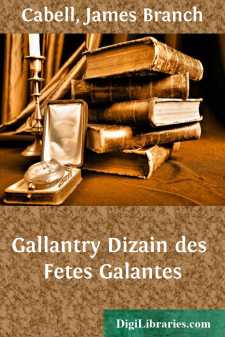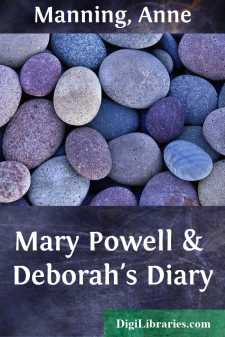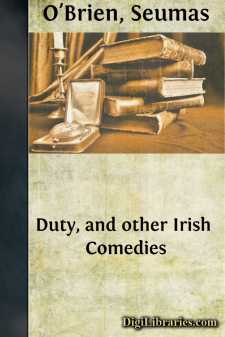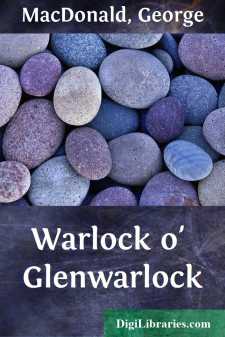Fiction
- Action & Adventure 180
- Biographical 15
- Christian 59
- Classics
- Coming of Age 5
- Contemporary Women 3
- Erotica 8
- Espionage/Intrigue 12
- Fairy Tales, Folklore & Mythology 236
- Family Life 169
- Fantasy 117
- Gay 1
- General 596
- Ghost 32
- Historical 808
- Horror 43
- Humorous 160
- Jewish 25
- Legal 4
- Medical 22
- Mystery & Detective 315
- Political 49
- Psychological 41
- Religious 64
- Romance 159
- Sagas 11
- Science Fiction 730
- Sea Stories 113
- Short Stories (single author) 537
- Sports 10
- Suspense 1
- Technological 8
- Thrillers 2
- Urban Life 31
- Visionary & Metaphysical 1
- War & Military 173
- Westerns 199
Classics Books
Sort by:
by:
Henry V. Boynton
WAS GENERAL THOMAS SLOW AT NASHVILLE? new generation has come upon the stage since our civil war. It has its own writers on the events of that struggle. Some of these, careful students as they are, make proper and effective use of the stores of material which the Government has collected and published. Others, stumbling upon interesting dispatches of notable campaigns, read them in connection with...
more...
CHAPTER I Richard Carter had called the place "Crownlands," not to please himself, or even his wife. But it was to his mother's newly born family pride that the idea of being the Carters of Crownlands made its appeal. The estate, when he bought it, had belonged to a Carter, and the tradition was that two hundred years before it had been a grant of the first George to the first of the name...
more...
by:
G. M. Godden
CHAPTER I YOUTH "I shall always be so great a pedant as to call a man of no learning a man of no education."—Amelia. Henry Fielding was born at Sharpham Park, near Glastonbury, on the 22nd of April 1707. His birth-room, a room known as the Harlequin Chamber, looked out over the roof of a building which once was the private chapel of the abbots of Glastonbury; for Sharpham Park possessed no...
more...
THE ANSWER. Spare me, dread angel of reproof,And let the sunshine weave to-dayIts gold-threads in the warp and woofOf life so poor and gray. Spare me awhile; the flesh is weak.These lingering feet, that fain would strayAmong the flowers, shall some day seekThe strait and narrow way. Take off thy ever-watchful eye,The awe of thy rebuking frown;The dullest slave at times must sighTo fling his burdens...
more...
INTRODUCTION These paragraphs, dignified by the revised edition of Gallantry and spuriously designated An Introduction, are nothing more than a series of notes and haphazard discoveries in preparation of a thesis. That thesis, if it is ever written, will bear a title something academically like The Psychogenesis of a Poet; or Cabell the Masquerader. For it is in this guise—sometimes self-declared,...
more...
by:
Horace B. Day
INTRODUCTION. This volume has been compiled chiefly for the benefit of opium-eaters. Its subject is one indeed which might be made alike attractive to medical men who have a fancy for books that are professional only in an accidental way; to general readers who would like to see gathered into a single volume the scattered records of the consequences attendant upon the indulgence of a pernicious habit;...
more...
by:
Olive Schreiner
I. THE LOST JOY. All day, where the sunlight played on the sea-shore, Life sat. All day the soft wind played with her hair, and the young, young face looked out across the water. She was waiting—she was waiting; but she could not tell for what. All day the waves ran up and up on the sand, and ran back again, and the pink shells rolled. Life sat waiting; all day, with the sunlight in her eyes, she sat...
more...
by:
Anne Manning
INTRODUCTION In the Valhalla of English literature Anne Manning is sure of a little and safe place. Her studies of great men, in which her imagination fills in the hiatus which history has left, are not only literature in themselves, but they are a service to literature: it is quite conceivable that the ordinary reader with no very keen flair for poetry will realise John Milton and appraise him more...
more...
by:
Seumas O'Brien
DUTY Back kitchen of a country public house. Micus and Padna seated at a table drinking from pewter pints. Mrs. Cotter enters in response to a call. PADNA (pointing to pint measures)Fill 'em again, ma'am, please. MRS. COTTER (taking pints, and wiping table)Fill 'em again, is it? Indeed I won't do any such thing. MICUSIndeed you will, Mrs. Cotter. MRS. COTTER Don't you know that...
more...
by:
George MacDonald
CHAPTER I. CASTLE WARLOCK. A rough, wild glen it was, to which, far back in times unknown to its annals, the family had given its name, taking in return no small portion of its history, and a good deal of the character of its individuals. It lay in the debatable land between highlands and lowlands; most of its inhabitants spoke both Scotch and Gaelic; and there was often to be found in them a notable...
more...


